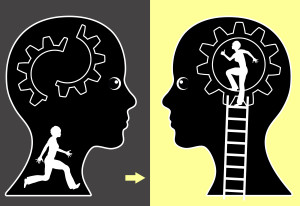 Recently, someone blocked me on social media, and I wanted to share with you, briefly, some of the process I used to deal with the feelings that engendered. This is an example of the power of self-coaching.
Recently, someone blocked me on social media, and I wanted to share with you, briefly, some of the process I used to deal with the feelings that engendered. This is an example of the power of self-coaching.
Self-coaching means asking yourself the questions that a coach might ask you, and trying to tease out the answers in a way that helps you understand your emotional reactions to things that happen.
So the first question is, What happened?
Answer: She blocked me.
Note that I tried to keep the answer as factual as possible – I don’t know whether she was angry, and I’m not calling her names. Just the facts, ma’am.
Next comes: What do you think that means? And how do you feel about it?
Answer: She didn’t want to talk to me anymore, ever. I’m upset about that.
That is a thought that I have. I don’t actually know why she did that. The whole story from the moment I discovered she had blocked me is now taking place entirely inside my head.
Now this is where I could go very negative and down on myself. I could tell myself that I’m a terrible person, that I mishandled the conversation, etc. I could beat myself up. But how useful would that be?
The real reason I’m upset, of course, is because my own self-image, as somebody whom everybody loves and wants to talk to, just took a hit.
Once I realised that, I could let go of it, and take it as a learning experience. I do not have to choose any negative thoughts about myself because of her choice to block me.
By the end of this internal conversation, I was no longer upset that this person had blocked me, and was able to consider dispassionately how I needed to improve my conversational skills to prevent a recurrence.
Self-coaching allows me to decide how I want to feel about something that happened, rather than allowing negative and self-denigrating thoughts to run rampant through my head. I can learn from the negative experience, without feeling bad about myself. It’s a wonderful gift.
